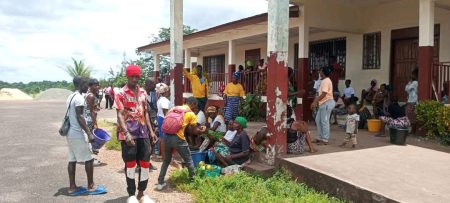Liberia is enduring severe economic challenges, ranking among the ten poorest nations globally. This dire situation is attributed to rampant corruption and bureaucratic inefficiencies that deter foreign investment, hampering economic growth and development. Recent statistics highlight significant issues within the country, particularly concerning child nutrition and food security. According to Agriculture Minister Alexander Nuetah, approximately 4% of Liberian children under the age of five are malnourished, while around 2.2 million individuals—almost half of the population—are facing food insecurity. The statistics paint a troubling picture, pointing to an urgent need for intervention and strategic planning to address these pressing issues.
In a recent announcement during the launch of the Comprehensive Food Security and Nutrition Survey (CFSNS), Minister Nuetah emphasized the need for decisive action to combat malnutrition and enhance food security in Liberia. The survey aims to provide a clearer understanding of the current food security situation and nutritional needs within the country. Minister Nuetah referenced a 2021 Global Nutrition Survey that indicated around 29% of children under five years in Liberia experience stunted growth, a significant indicator of long-term developmental issues stemming from food insecurity and inadequate nutrition.
Despite the challenges posed by past epidemics like Ebola and the COVID-19 pandemic, Liberia has made some advancements toward achieving food security. The government is taking proactive steps to address the crisis, but it is clear that more remains to be done. The CFSNS seeks to engage various stakeholders—both local and international—through a multi-sectoral approach to ensure comprehensive data collection and analysis of the food security landscape. This collaborative strategy is critical for identifying vulnerabilities and developing effective measures to tackle food insecurity.
The financial commitment made by Minister Nuetah, amounting to US$144,300, reflects the government’s dedication to improving food security and nutritional outcomes in Liberia. He urged national and international partners to support these efforts, recognizing that effective change cannot occur without collaboration from various sectors, including health, agriculture, and education. The goal of the survey is not only to document the current state of food and nutrition but also to foster a concerted response to the multifaceted challenges faced by the population.
Richard Ngafuan, the Director-General-designate of the Liberia Institute of Statistics and Geo-Information Services (LISGIS), underscored the institute’s commitment to providing the necessary technical support for the CFSNS. Operating on reliable data is essential for informed decision-making and effective policy implementation. The collaboration between government ministries and institutes like LISGIS is vital for creating a blueprint that addresses Liberia’s nutritional needs comprehensively, especially in light of the high rates of child malnutrition and food insecurity.
The CFSNS initiative is a promising step forward for Liberia, which has struggled with slow progress in alleviating extreme poverty and malnutrition among its youngest citizens. By prioritizing food security and nutrition statistics, Liberia aims to devise targeted interventions that can elevate the living standards of its population, especially vulnerable children. While the road ahead remains filled with challenges, this survey represents a crucial element in forming a comprehensive security strategy that could propel Liberia towards better health outcomes and sustainable development in the future.














